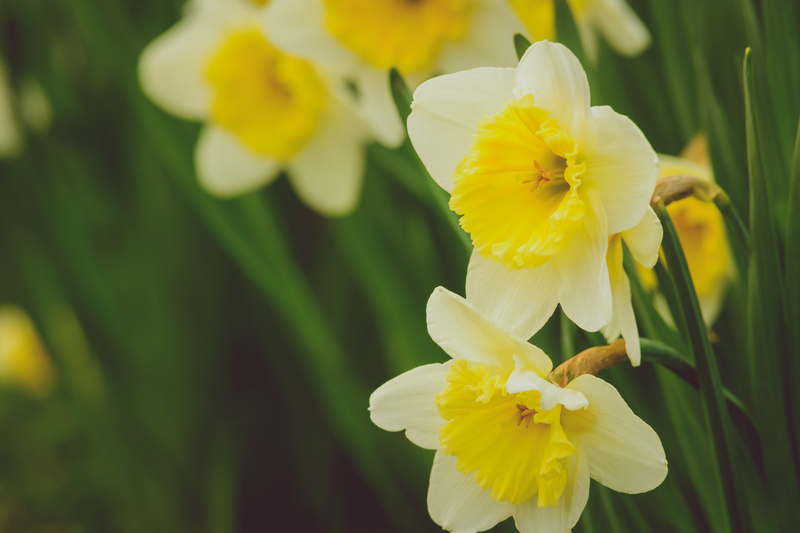Essential Features for a Captivating Kid-Friendly Garden
Posted on 14/06/2025
Essential Features for a Captivating Kid-Friendly Garden
Children's gardens hold a special place in the hearts of both young explorers and their caregivers. A well-designed kid-friendly garden is not only whimsical and full of fun, but also safe and educational. Whether you have a sprawling suburban backyard or a compact city plot, creating a captivating outdoor space for children can enrich their lives, foster creativity, and encourage healthy movement. In this comprehensive guide, we explore the most essential features for a kid-friendly garden, with practical tips on garden design, safety, play elements, and more. Let's dig in!
Why Create a Kid-Friendly Garden?
Before delving into the nuts and bolts of garden design, let's explore the many benefits of a kid-friendly garden for children's development:
- Sensory stimulation through colorful flowers, textured plants, and natural sounds.
- Physical activity that promotes coordination, strength, and agility.
- Learning opportunities covering topics like biology, ecology, and nutrition.
- Emotional well-being fostered by time spent outdoors.
- Enhanced creativity through imaginative play and interactive spaces.
Designing a backyard suitable for children provides far more than a fun play area -- it's an environment for growth, learning, and connection with nature.

Top Features for the Ultimate Kid-Friendly Garden
From playful nooks to safe planting beds, an effective kid-centered garden weaves together a variety of elements. Below, we delve into essential features for a safe and enchanting children's garden. Combine these ideas to craft a space that will captivate the curiosity of your little ones for years to come.
1. Safety First: Designing a Secure Space
No feature is more crucial in a kid-friendly yard than safety. Parents can relax and children can explore freely when the area is designed with protection in mind:
- Fencing: Enclose the area with a sturdy, safe fence to prevent accidents and deter unwanted visitors or pets.
- Soft Surfaces: Incorporate grass, mulch, or rubber mats under play equipment and around running paths to cushion falls.
- Non-toxic Plants: Choose only child-safe plants to avoid accidental ingestion of toxic varieties.
- Shaded Zones: Add shade sails, pergolas, or tree canopies to protect delicate skin from harmful sun exposure.
- Secure Storage: Keep gardening tools and potentially dangerous materials locked away and out of reach.
Regular maintenance, such as checking for protruding nails, splinters, or tripping hazards, ensures year-round safety.
2. Inviting Play Structures
Children thrive with opportunities for active and imaginative play. Including thoughtfully chosen equipment will transform your garden into the neighborhood's favorite playground:
- Swings and Slides: Timeless favorites that offer hours of fun while developing balance and coordination.
- Climbing Structures: Jungle gyms, rope ladders, and climbing walls invite energetic kids to test their skills.
- Playhouses or Forts: Foster creative role-playing, secret hideouts, and storytelling adventures.
- Sand and Water Play: Sensory tables, mud kitchens, or dedicated sandpits provide hands-on experiences and developmental benefits.
When selecting or building play equipment, prioritize age-appropriateness, stability, and smooth surfaces to avoid injuries.
3. Engaging Sensory Elements
Sensory-rich environments stimulate growth and curiosity. Consider integrating features that engage all five senses:
- Colorful Flower Beds: Use beds packed with vivid, non-toxic blooms like sunflowers, zinnias, or marigolds.
- Herb Gardens: Let kids feel and smell aromatic herbs such as mint, basil, or lavender.
- Textured Paths: Create stepping stones or trails with varied materials (pebbles, smooth rocks, bark chips).
- Water Features: Incorporate gentle fountains or birdbaths for soothing sounds and wildlife attraction.
*Encourage children to help plant, water, and even harvest from these zones -- making gardening both fun and educational!*
4. Grow-Your-Own Edible Garden Beds
One of the most rewarding aspects of a child-friendly yard is the opportunity to cultivate edible plants. Kid-sized raised beds or container gardens are perfect for teaching responsibility and patience while promoting healthy eating habits:
- Easy-to-Grow Crops: Try cherry tomatoes, radishes, strawberries, and snap peas -- all favorites for little taste-testers.
- Mini-Greenhouses: Portable greenhouses let curious minds observe plant life cycles up close.
- Personal Gardening Kits: Provide child-sized gloves, watering cans, and trowels to foster independence.
Label plants with handmade signs and celebrate first harvests with a garden-to-table snack session for an unforgettable learning experience!
5. Nature Exploration and Discovery Areas
Every captivating children's garden design should spark a sense of adventure. Interactive zones can introduce kids to new concepts and wildlife:
- Bug Hotels and Butterfly Gardens: Construct simple bug habitats from recycled materials, and add milkweed or buddleia to attract butterflies.
- Rock Piles and Log Stacks: Safe, supervised exploration spots offer homes for frogs, insects, or lizards.
- Bird Feeders and Nest Boxes: Entice backyard birds for birdwatching and science lessons.
- Observation Stations: Place stumps or benches for quiet nature-watching and sketching.
Immersing children in these zones fosters a lifelong appreciation for wildlife and biodiversity.
6. Artistic & Creative Spaces
Unleash children's creativity by setting aside areas for art, craft, and expression. These spaces can be as simple or intricate as you wish:
- Chalkboard Walls: Install weather-resistant chalkboards or paint fences for outdoor drawing fun.
- DIY Sculpture Corners: Use clay, stones, or sticks for making natural art installations.
- Mosaic Pathways: Invite kids to help design pathways with bright tiles, gems, or shells.
- Musical Instruments: Hang wind chimes, install homemade xylophones, or create drumming stations from recycled objects.
The key is to foster self-expression and imagination in a kid-friendly garden environment.
7. Cozy Nooks and Reading Zones
Every vibrant garden needs quiet corners for rest and reflection. Tuck away a hammock, bean bag, or picnic blanket under a shady tree. Use trellised vines or colorful screens to create *secret hideouts* -- perfect for storytime, naps, or simply gazing up at the clouds.
- Story Circles: Arrange log seats or a round rug for group readings and sharing.
- Hammocks and Sway Seats: Gentle swaying can soothe and calm energetic youngsters.
- Fairy Gardens or Miniature Scenes: Mini landscapes inspire storytelling and make-believe play.
Design Tips for Creating an Outstanding Kid-Friendly Garden
Now that we've outlined key features, let's look at *practical strategies* for all kid-safe backyard design projects to ensure your garden is as captivating as it is functional:
1. Plan Zones for Different Ages & Interests
If you have kids of various ages, design flexible spaces that grow with your children. Adapt activity areas as their interests and abilities evolve, from sand pits for toddlers to vegetable patches and climbing walls for pre-teens.
2. Prioritize Visibility and Flow
*Design with supervision in mind!* Paths and open spaces should always allow adults to keep an eye on children without hovering. Arrange busy play areas in the line of sight from patios or kitchen windows.
3. Include Natural Materials
Whenever possible, use wood, stone, and living plants to create a natural, welcoming atmosphere. Avoid sharp metal edges or plastic-heavy designs for a more environmentally friendly, sustainable garden.
4. Encourage Free Play & Exploration
Avoid over-scheduling play or dictating activities. Instead, let the garden evolve as a space for open-ended discovery and imagination. Loose parts play -- with sticks, leaves, and rocks -- sparks creativity and problem-solving.
5. Get Kids Involved in the Process
Invite children's ideas, preferences, and creativity from the start. Letting them choose plants, colors, or a theme for a playhouse gives them a sense of ownership and pride in their own outdoor haven.
Choosing the Right Plants for a Safe Kid-Friendly Garden
Plant selection is vital for a risk-free, sensory-rich garden. Here's what to keep in mind:
- Non-Toxic Species: Consult lists from trusted sources and avoid toxic dangers like foxglove, oleander, or nightshade.
- Allergy-Friendly Choices: Steer clear of highly allergenic plants like ragweed or some ornamental grasses.
- Hands-On Varieties: Lamb's ear (for touch), snapdragons (for imaginative play), and lavender (for scent) are wonderful picks.
- Edible Plants: Blueberries, pumpkins, and peas are both safe and tasty for curious nibblers.
Always teach children not to eat anything from the garden without adult guidance. Clearly label all plants and avoid hazardous fertilizers or pesticides.

Maintenance Tips for a Thriving Children's Garden
Upkeep is essential to keep your outdoor space beautiful, fun, and safe. Here's how to make maintenance a breeze:
- Involve Kids: Assign simple, age-appropriate chores like watering, deadheading flowers, or gathering sticks.
- Stay on Top of Repairs: Check equipment, fences, and structures routinely for signs of wear or damage.
- Yearly Updates: Assess which features your children have outgrown and adapt garden zones as needed.
- Seasonal Projects: Refresh flower beds in spring, add mulch in summer, and clean up in fall and winter.
Final Thoughts: Your Blueprint for an Amazing Kid-Friendly Garden
Designing a captivating kid-friendly garden is a rewarding process that combines safety, play, sensory exploration, learning, and creativity. By integrating these essential features, you'll inspire a love of nature, foster healthy habits, and create unforgettable family memories.
Start small -- perhaps with a vibrant flower bed or a cozy reading nook -- and let your child's unique interests lead you. The beauty of a kid-friendly garden lies in its flexibility and constant evolution, just like the children it serves.
- Prioritize safety, discovery, and fun
- Include interactive, sensory-rich zones
- Encourage creativity with art and play spaces
- Get the whole family involved in planning and maintenance
Happy gardening! With a thoughtful design and a touch of imagination, your kid-friendly backyard will become the ultimate outdoor playground and learning garden, brimming with laughter and life.


